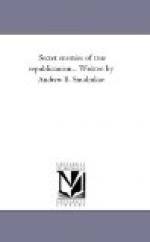On Saturday, Feb. 17, 1838, I was again awakened at 3 o’clock A.M. as at my former commission, and commanded by my leader, to write again to the bishop and explain my message given to the congregation to assemble on the next day in a Protestant School house unless the bishop would acknowledge his fault and do what was required. I assured him most solemnly, that all those steps were done under strict direction of the spirit who had confirmed my mission; therefore “nisi haec feceris, tecum in sacris communicare non possum.” It is to be understood, that I wrote to him in Latin, and said: “If thou, Bishop, wilt not do this,” that is, if thou wilt not sign the Epistle and co-operate with us, “I can have no ecclesiastical communion with thee.” The Epistle was then carried and handed to him at 8 o’clock A.M. of that day.
Soon after that a deputation of our congregation came to me. They reported that our message according to our agreement, was spread in the congregation, but there was a means, to satisfy the spirit; because the Catholic Cathedral Church does not belong to the bishop, but to the nations. The deputation assured me that Roman Catholics and Protestants of different nations have contributed freely to build that church, and I could explain freely in the church what I had to communicate to the congregation; since neither the bishop nor any of his priests understood German. It was evident, that one of the three was under the influence of a prudent spirit. But I replied, that in steps of such consequence I must act strictly according to the order of the spirit. They should therefore go to the bishop. Perhaps they might move him to sign the Epistle. They went; but they returned with the message, that they found the bishop not well, entreating me very much that although he could not sign my encyclic Epistle, I should go in the church, and difficulties would be then amicably settled. From that circumstance I understood, that the bishop did not comprehend what it was, to




